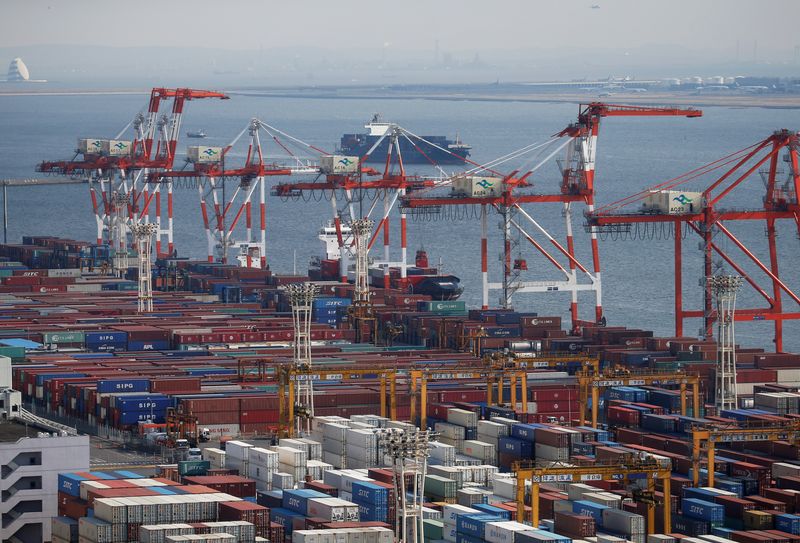By Tetsushi Kajimoto
TOKYO (Reuters) -Japan's imports grew more than 40% for a fifth straight month in September to hit the largest value on record as a slump in the yen aggravated already high fuel import costs, stoking fears of cost-push inflation.
The surge in imports overwhelmed growth in exports, resulting in a 2 trillion yen ($13.3 billion) trade deficit and extending the run of shortfalls to 14 months, adding to downward pressure on the Japanese currency.
For the fiscal first half to end-September, Japan's trade deficit jumped to a record 11 trillion yen, the Ministry of Finance (MOF) data showed, driven by surging fuel bills and a 20% decline in the yen against the dollar over the period.
Persistent deficits worsen Japan's terms of trade, causing a shift of domestic income overseas and undermining Japanese purchasing power.
Once welcomed for making exports more competitive, the yen's weakness is now seen hurting households and retailers by inflating already high prices of imported fuel and food. The currency's sharp falls also heighten uncertainty for firms making business decisions.
"Surging imports are by no means a reflection of strength in domestic demand. Instead, higher living costs will prompt households to tighten their belts," said Takeshi Minami, chief economist at Norinchukin Research Institute.
"The weak yen may be inflating export value, but external demand is slowing down. I would not be surprised if Japan would follow Europe and the United States in sliding into recession next year when the global tightening cycle runs its course."
The MOF data showed Japan's imports rose 45.9% year-on-year in September, led by crude oil, liquefied natural gas and coal, roughly matching economists' median estimate.
It was the 20th straight month of gains and took imports to 11 trillion yen, the largest value on record, according to MOF data going back to 1979. Imports rose 49.9% in the previous month.
Exports rose 28.9% in September from the same month a year ago, driven by U.S.-bound shipments of cars and demand for chip and electronics parts from South Korea. The rise compared with a 27.1% increase expected by economists, taking the value of exports to the largest on record.
By region, exports to China, Japan's largest trading partner, grew 17.1% year-on-year in September, led by demand for cars and chip-making equipment.
U.S.-bound shipments advanced 45.2% in the year to September, led by shipments of cars, construction and mining machinery.
Japan's economy expanded at an annualised 3.5% in April-June, posting a third straight quarter of growth, as the lifting of COVID-19 curbs boosted consumer and business spending.

Japanese authorities spent 2.8 trillion yen last month intervening to sell the dollar and buy the yen for the first time since 1998 to support the Japanese currency.
($1 = 149.8700 yen)
